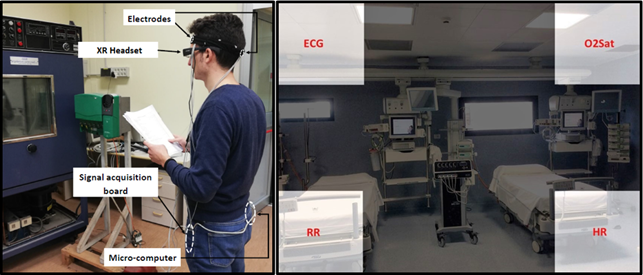
Application field
Health 4.0, Industry 4.0, Daily Life
Technologies
Brain-Computer Interface, eXtended Reality, Artificial Intelligence
Goals
Development of highly wearable, non-invasive Brain-Computer Interfaces (BCIs) based on the detection of the Steady-State-Visually Evoked Potentials (SSVEPs).
eXtended Reality (XR) is proposed as an innovative technology to render the flickering stimuli necessary to the SSVEPs elicitation. The user, by wearing an XR headset and a portable EEG acquisition unit, is able to send the desired command to the target application, by simply looking at the desired icon, which is overlayed to the surrounding world.
In this way, the user is not forced to stand in front of a PC Monitor and will be able to use the proposed BCI in a wider variety of applications, from daily life to Health and Industry 4.0.
Activities
- Experimental characterization of EEG acquisition units and XR headsets.
- Development of algorithms for classifying EEG data by also exploiting Machine Learning and Deep Learning technologies.
- Prototyping of portable and wearable devices to be used for daily-life, health, and industry applications.
Challenges
- Improving the accuracy and information transfer rate of the system.
- Reducing the users’ eye fatigue while using the system.
Bibliography
- Apicella et al., "Adoption of Machine Learning Techniques to Enhance Classification Performance in Reactive Brain-Computer Interfaces," 2022 IEEE International Symposium on Medical Measurements and Applications (MeMeA), 2022, pp. 1-5, doi: 10.1109/MeMeA54994.2022.9856441.
- Angrisani et al., "A ML-based Approach to Enhance Metrological Performance of Wearable Brain-Computer Interfaces," 2022 IEEE International Instrumentation and Measurement Technology Conference (I2MTC), 2022, pp. 1-5, doi: 10.1109/I2MTC48687.2022.9806518.
- Apicella et al., "Enhancement of SSVEPs Classification in BCI-Based Wearable Instrumentation Through Machine Learning Techniques," in IEEE Sensors Journal, vol. 22, no. 9, pp. 9087-9094, 1 May1, 2022, doi: 10.1109/JSEN.2022.3161743.
- Arpaia, Pasquale, et al. "Performance enhancement of wearable instrumentation for AR-based SSVEP BCI." Measurement196 (2022): 111188.
- Arpaia, Pasquale, et al. "Highly wearable SSVEP-based BCI: Performance comparison of augmented reality solutions for the flickering stimuli rendering." Measurement: Sensors18 (2021): 100305.
- Arpaia, Pasquale, Egidio De Benedetto, and Luigi Duraccio. "Design, implementation, and metrological characterization of a wearable, integrated AR-BCI hands-free system for health 4.0 monitoring." Measurement177 (2021): 109280.
- Arpaia, Pasquale, et al. "A Wearable SSVEP BCI for AR-Based, Real-Time Monitoring Applications." 2021 IEEE International Symposium on Medical Measurements and Applications (MeMeA). IEEE, 2021
- Arpaia, S. Criscuolo, E. D. Benedetto, N. Donato and L. Duraccio, "Evaluation of the Effectiveness of a Wearable, AR-based BCI for Robot Control in ADHD Treatment," 2022 IEEE International Conference on Metrology for Extended Reality, Artificial Intelligence and Neural Engineering (MetroXRAINE), 2022, pp. 630-634, doi: 10.1109/MetroXRAINE54828.2022.9967655.
- Arpaia, S. Criscuolo, E. De Benedetto, N. Donato and L. Duraccio, "A Wearable AR-based BCI for Robot Control in ADHD Treatment: Preliminary Evaluation of Adherence to Therapy," 2021 15th International Conference on Advanced Technologies, Systems and Services in Telecommunications (TELSIKS), 2021, pp. 321-324, doi: 10.1109/TELSIKS52058.2021.9606352.
- Arpaia, C. Bravaccio, G. Corrado, L. Duraccio, N. Moccaldi and S. Rossi, "Robotic Autism Rehabilitation by Wearable Brain-Computer Interface and Augmented Reality," 2020 IEEE International Symposium on Medical Measurements and Applications (MeMeA), 2020, pp. 1-6, doi: 10.1109/MeMeA49120.2020.9137144.
- Arpaia, L. Duraccio, N. Moccaldi and S. Rossi, "Wearable Brain–Computer Interface Instrumentation for Robot-Based Rehabilitation by Augmented Reality," in IEEE Transactions on Instrumentation and Measurement, vol. 69, no. 9, pp. 6362-6371, Sept. 2020, doi: 10.1109/TIM.2020.2970846.
- Angrisani, P. Arpaia, A. Esposito and N. Moccaldi, "A Wearable Brain–Computer Interface Instrument for Augmented Reality-Based Inspection in Industry 4.0," in IEEE Transactions on Instrumentation and Measurement, vol. 69, no. 4, pp. 1530-1539, April 2020, doi: 10.1109/TIM.2019.2914712.
- Arpaia, L. Callegaro, A. Cultrera, A. Esposito and M. Ortolano, "Metrological Characterization of Consumer-Grade Equipment for Wearable Brain–Computer Interfaces and Extended Reality," in IEEE Transactions on Instrumentation and Measurement, vol. 71, pp. 1-9, 2022, Art no. 4002209, doi: 10.1109/TIM.2021.3127650.





